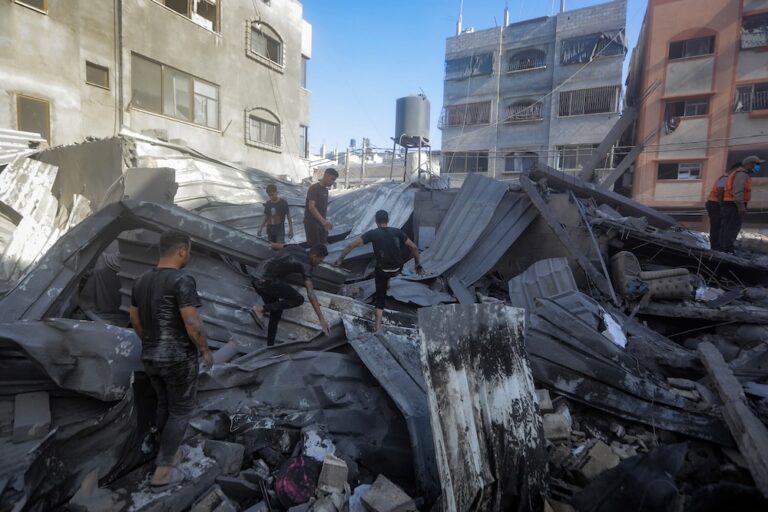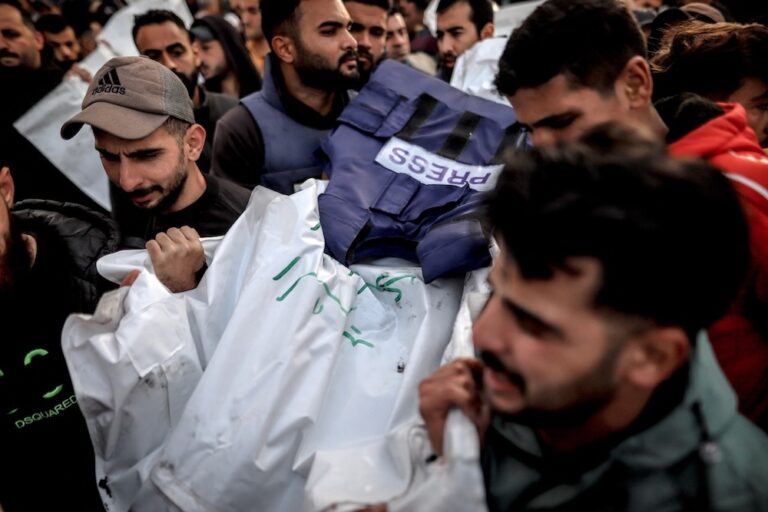Journalists who were aboard the humanitarian flotilla that was intercepted by Israeli naval commandos recounted their experiences.
(RSF/IFEX) – 9 June 2010 – Journalists who were aboard the humanitarian flotilla that was intercepted by Israeli naval commandoes on 31 May have been recounting their experiences. At the same time, Turkish journalist Cevdet Kiliçlar, who was fatally shot at the start of the assault of the Mavi Marmara, one of vessels in the flotilla, was buried in Istanbul on 4 June. A news photographer who graduated from Marmara University’s Faculty of Communication, Kiliçlar had worked in the past for such Islamist newspapers as Selam (Salute), Vakit (Time) and Milli Gazete (National Newspaper) and had applied for an official press card while working for Milli Gazete.
For the past year he had worked for the Humanitarian Relief Foundation (IHH), a Turkish NGO, as press officer and website editor. He was killed by a single shot to the head fired at close range by an Israeli soldier.
The Turkish Union of Journalists (TGS) has protested against Kiliçlar’s death, which it says should be treated as a murder, and has called for an investigation to establish the exact circumstances in which he was killed.
All the journalists who were detained by the Israeli authorities have now been deported from Israel and many of them have been talking about what they went through.
Mediha Olgun (Turkish woman journalist with the daily Sabah):
“I was released 72 hours after the start of the military operation. I was forced to go back into my cabin where they gave me a full search. They cut into the heels of my shoes to see if I had hidden anything there. That is how they found the copies of the photos we had kept. They seized my laptop, my camera and mobile phone. The only thing I was able to hold on to was my passport. They also took our photos.”
Ayse Sarioglu (Turkish woman journalist with the daily Taraf):
“I was terrified when I saw Kiliçlar on the ground. That is when I cried. . . They searched absolutely everything. From the boat, they took us to a large shed in the port of Ashdod, where we were interrogated. I was humiliated by a policeman, although there was a woman officer there who was very polite. While interrogating me, he spat on me and called me an idiot. He even pulled my tongue. I could not believe my eyes, it was so inhuman!
“They accused us of being within 10 miles of Israeli territory. I replied that we were 70 miles away and in international waters. ‘You knew that Gaza was forbidden.’ I replied: ‘Yes, but I did not come here because I wanted to. I am a journalist and it is my job.’ ‘It is of little importance that you are a journalist. You have broken a rule.’ They asked me to sign a statement but I refused, asking for a translator from the Turkish embassy. ‘Whether you sign or not, you will be deported.’ We were searched meticulously, between our toes, in our hair, under our gums, under the tongue and so on. They took us to Beer Sheva prison. I was questioned again. They asked me if I was a member of Hamas or Al Qaeda. They also asked me if there were Palestinians in my family.
“I was able to call and talk to my family for just one minute and in English. On the afternoon of the next day, I was put in contact with Turkish embassy officials. We spent a second night in a prison cell. The next morning, they woke us at 6 a.m., gave us our passports and took us by bus to Ben Gurion airport.”
Erhan Sevenler (Turkish journalist with the semi-official news agency Anatolia-AA):
“When we learned of the presence of military boats and a submarine nearby, we began to take measures. All the journalists gathered at the stern of the boat to be able to film what was going to happen. At around 4 a.m., 15 to 20 zodiacs surrounded the ship. Very quickly, a helicopter lowered commandos to the bridge. As I rushed towards the bridge, people aboard our ship grabbed a soldier. Until that moment, I thought they were firing rubber bullets. That is when I realised they were firing live rounds. The windows of the bridge exploded under the impact of the bullets. The journalists then sought refuge in the office reserved for the press.”
(. . .)


